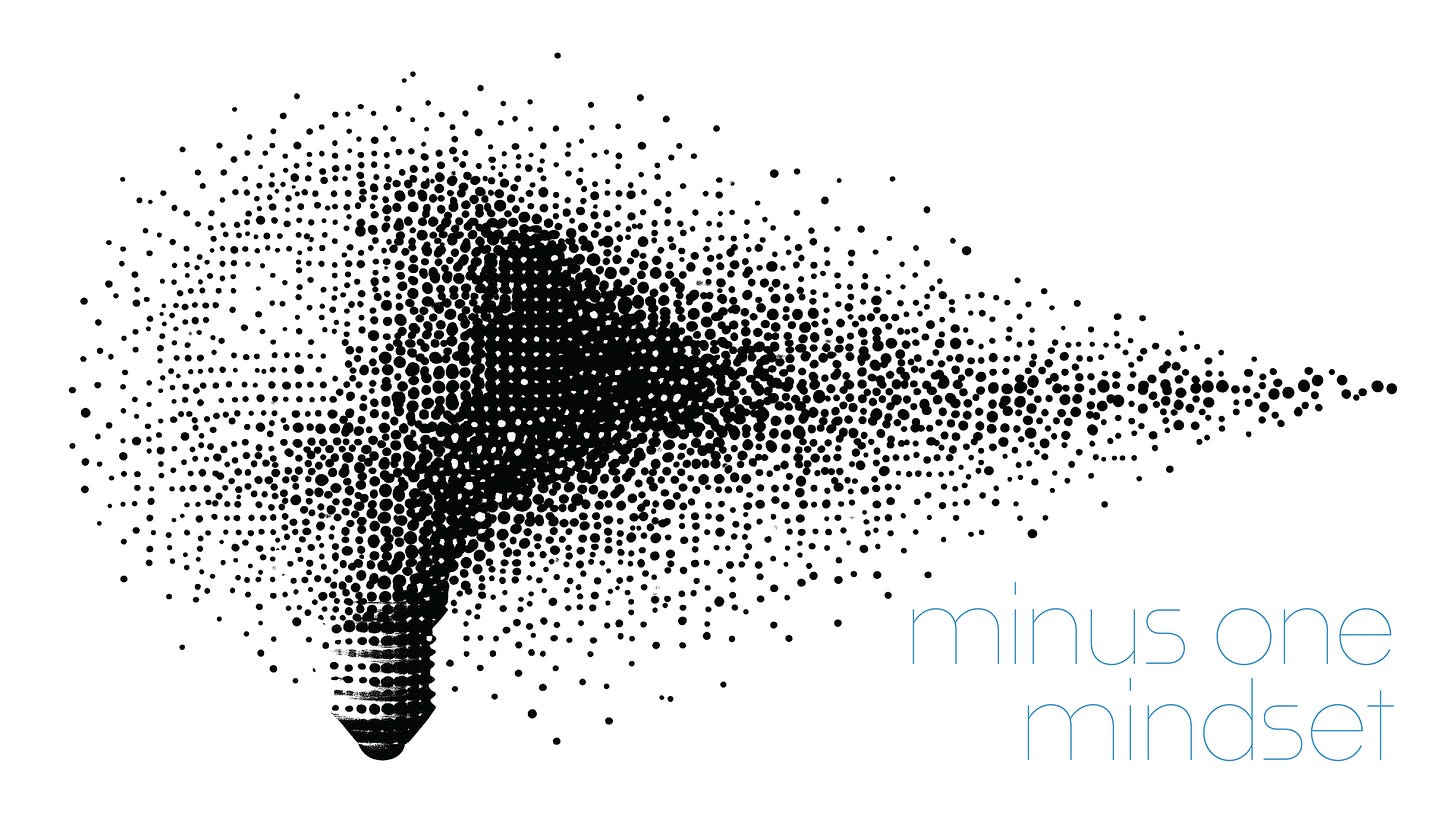The Minus One Mindset
How founders stay irreplaceable
Great Founders Never Leave Minus One
At first glance, Minus One looks like the initial stage of exploration, the messy precursor before a company is born. A founder leaves their job, chases a hunch, experiments and pivots before eventually hitting something real. Once the company launches, they’ve graduated to zero and have left the Minus One behind for good.
At South Park Commons, we defined Minus One. And we see it very differently.
Minus One is more than just a stage, it’s a mindset. It’s a way of seeing and operating that drives constant reinvention, in pursuit of the ingenuity that led to the company in the first place. Founders who drift away from this mindset risk slipping into pure optimization. When that happens, their role becomes negotiable. The frontier of technology will always have unknowns and the companies that endure are the ones led by founders who stay close to the edge. They’re the ones who remain comfortable in uncertainty, forcing themselves to re-enter Minus One again and again.
Anthropic didn’t stop at building frontier models. They took a new form factor from Minus One to Zero in Claude Code. Figma didn’t stop at design. They took on the entire creation process from ideation to code. Comun didn’t just push the frontier of existing banking infrastructure. They built new payment rails from the ground up.
Truly great companies aren’t just well-operated. They’re perpetually reborn.
Planting vs. Harvesting
Think of building a company as tending a field.
Great founders are both planters and harvesters. They notice new soil, imagine what could grow there, and are willing to take the risk to sow seeds before the rain comes. Harvesting is the work of operations, ensuring what’s growing is protected and efficient. Both are essential. Without harvesting, there’s no sustainability. Without planting, there’s no future.
The moment a founder stops planting, the future becomes constrained. The market catches up. So, the founder’s job is to keep planting. To keep discovering new sources of value even when the existing harvest looks good. That’s what makes a company durable. Not its ability to defend old fields, but its ability to cultivate new ones.
When founders get too comfortable in harvest mode, in operational excellence and optimizing what’s already known, they lose the very thing that made them founders in the first place. Founding is an act of invention. There will always be someone better at executing, managing, and optimizing than you. But no one else can create new value the way you can.
That’s your edge. That’s your Minus One mindset.
Look at Meta. Zuck is constantly in the Minus One of new exploration: social networks, VR, wearables, AI. It’s not easy to ask yourself what’s next.
Facebook took a risk in the mobile transition. In 2012, mobile revenue was essentially zero. The desktop ads that built the company didn’t translate. The user experience was clunky and Wall Street was skeptical. Zuck could have focused on optimizing desktop, improving margins, and making shareholders happy.
Instead, he bet the company on mobile. It was a massive return to Minus One. Figuring out how to make a new interface work, rebuilding core infrastructure, spending $1B on a 10 person team from Instagram. The bet paid off, but only because Zuck was willing to abandon certainty for possibility.
Today, Meta has a nearly $2T market cap. Yet they are investing $100B+ in capex and a billion in talent. Their biggest swing yet. Don’t fool yourself into thinking you can’t embrace the Minus One mindset at scale.
The Founder’s Moral Authority
Zuck can make those massive bets because founders hold a kind of moral authority that can’t be transferred or hired. It comes from living through the original Minus One, when the company was just a belief. Because they’ve been through that crucible, founders have earned the right to keep taking creative risks. They understand the DNA of their company at a level no outsider can. They can push their teams into uncomfortable, ambitious territory because they know what it takes to make something from nothing.
For Amit at Luma, his Minus One was making NeRFs work. It meant turning a promising but impractical research paper into something that could actually capture real-world scenes. Then came scaling to full 3D environments that weren’t just technically impressive, but felt alive. Then generating entirely new assets from scratch. Then tackling full video generation, where the complexity multiplies exponentially. Four years later? Amit’s still pushing the boundary of what's both technically and commercially possible.
Each transition required Amit to embrace the discomfort of becoming a beginner again. He could have stayed where he was. The current business was working and the work was interesting. But the greater opportunity was discovering a new frontier.
The moment a founder stops being creative, stops being opinionated, stops taking risks, they become replaceable. The company may still need leadership, but it no longer needs them. This is the hard truth most founders avoid. If a founder’s only contribution is operational, then their board will rationalize bringing in a more experienced executor. Someone who can optimize processes, manage teams, and harvest more efficiently.
But if a founder is still providing ingenuity, still planting new bets and new directions, then replacing them would mean amputating the company’s creative core. That’s why the Minus One mindset isn’t optional. It’s the founder’s moat.
At South Park Commons, we believe the most important ingredient in any company isn’t its product, market, or funding. It’s you, the founder. We’re not the partner who’ll just help you with execution. We’re the one who’ll help you sharpen your ambition and plant new fields. The one who will help you become great at the thing that makes you irreplaceable.


